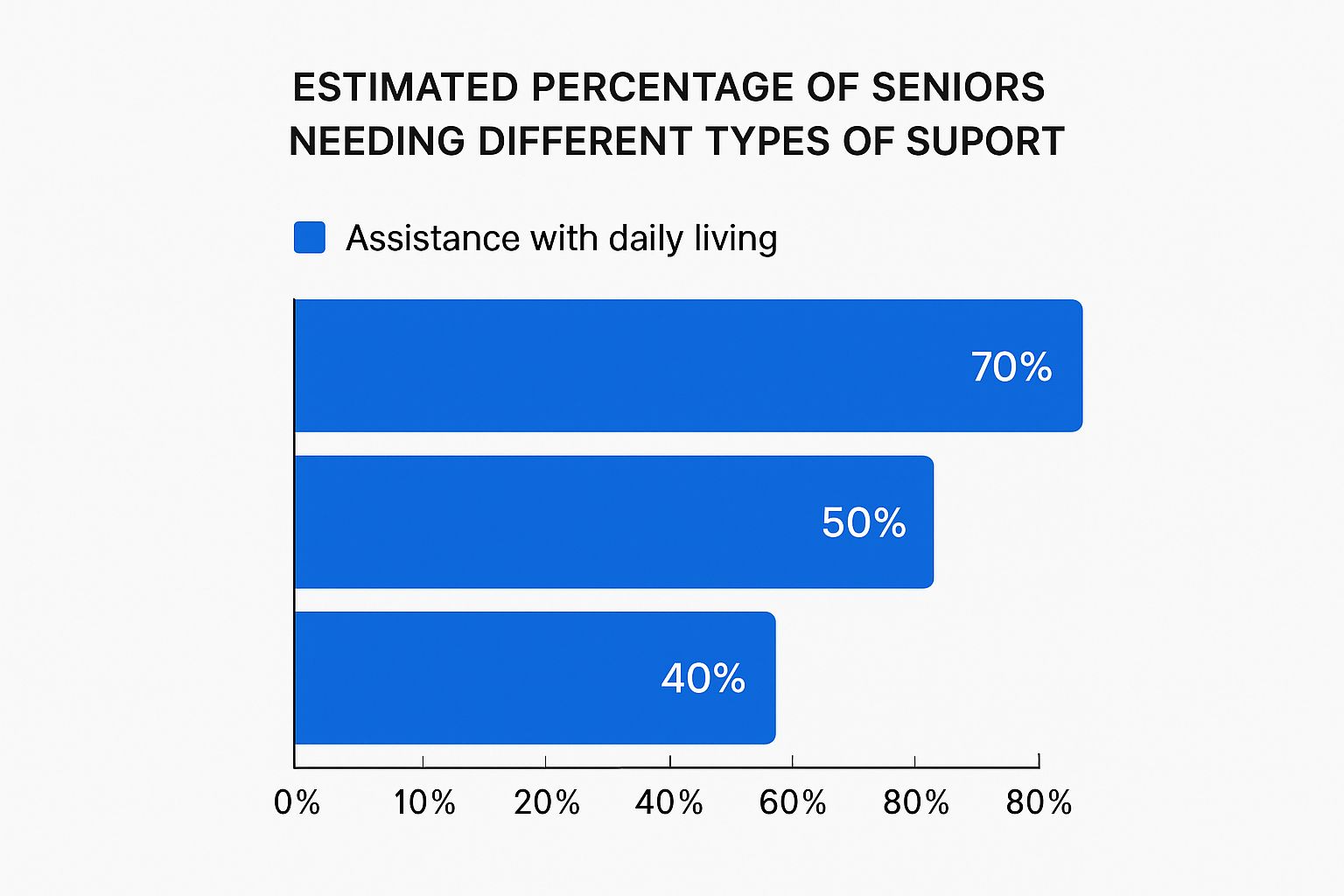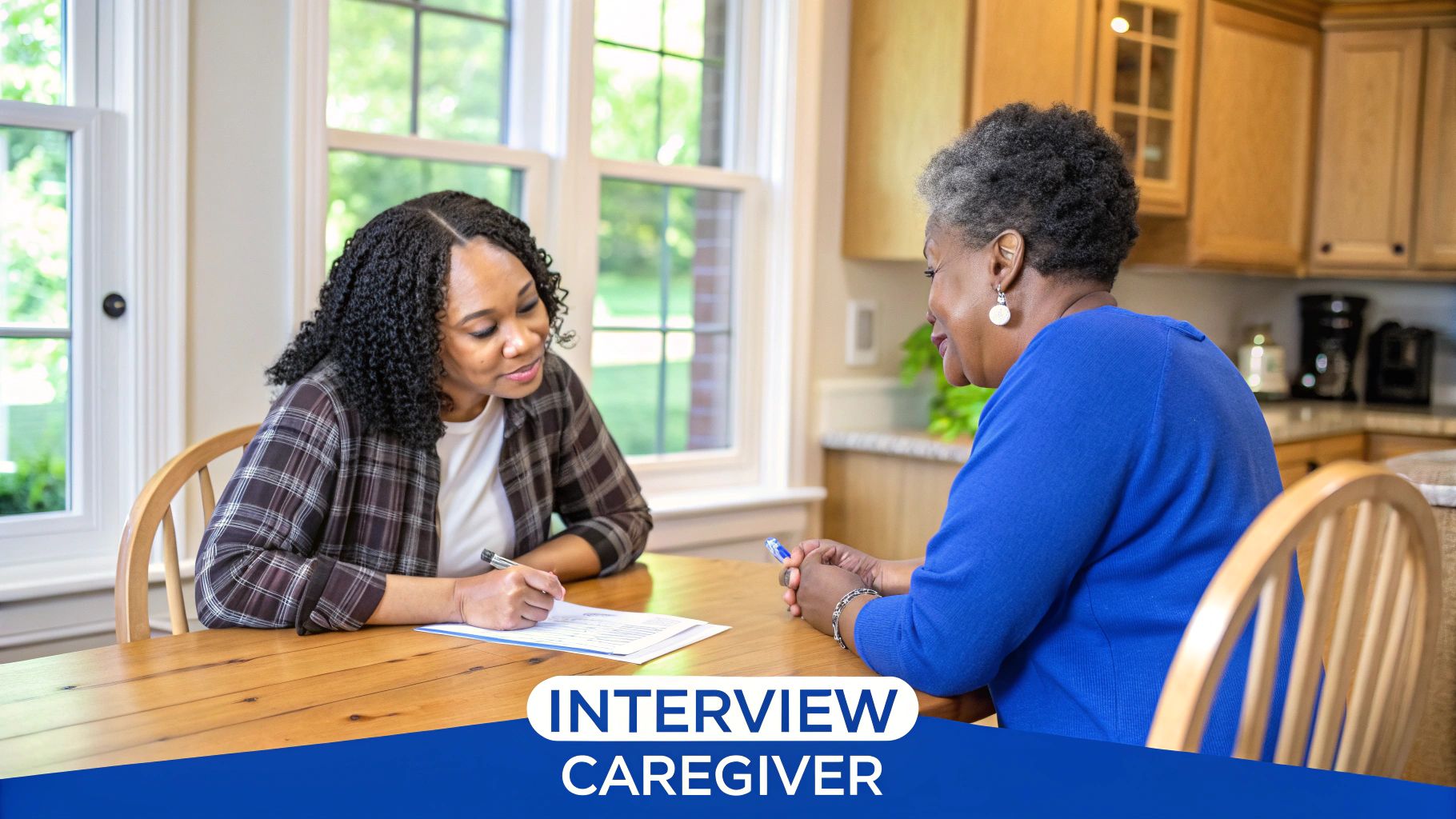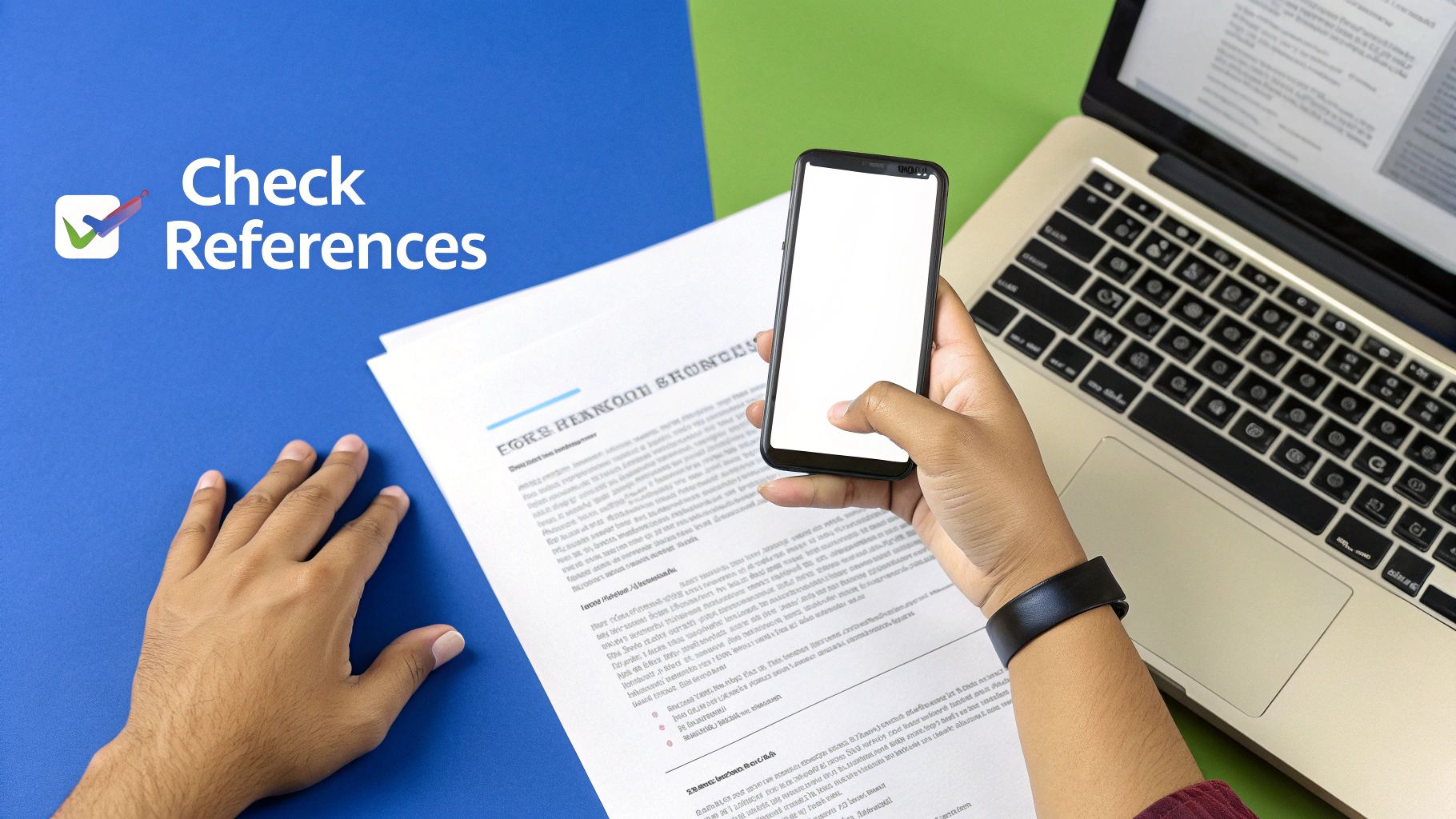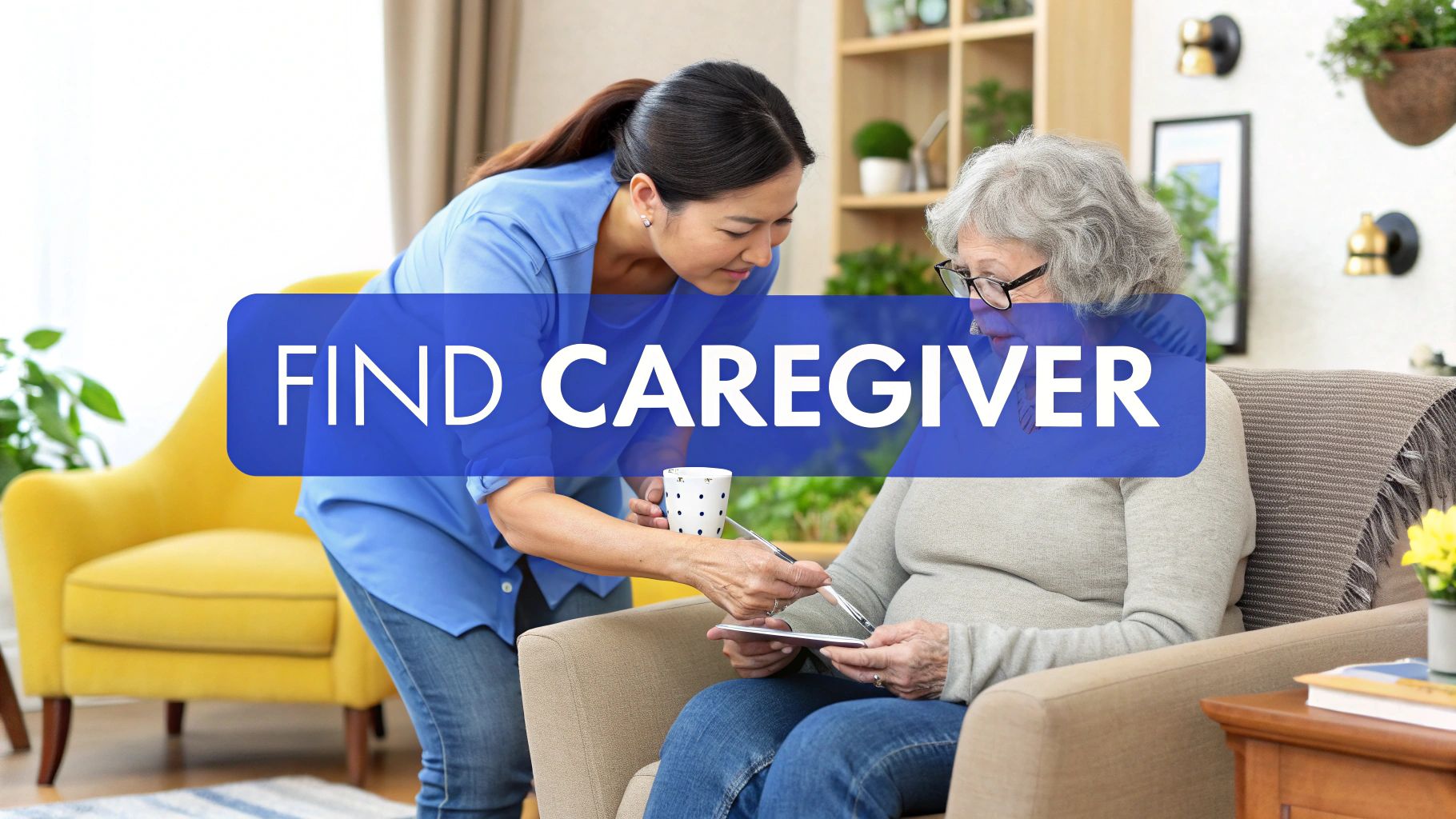Before you can even think about finding the right caregiver, you have to get crystal clear on what your loved one actually needs. This isn't just a vague feeling of "Mom needs some help around the house." It's about sitting down and creating a detailed, honest inventory of their daily life.
This first step is the single most important part of the entire process. It’s the foundation for your job description, your interview questions, and ultimately, your choice of who to bring into your home.
Start by being an observer for a few days. Pay close attention to your loved one’s routine. Where are the friction points? What tasks cause frustration or take far too long? An honest look at these daily struggles is what will guide you to a caregiver who can truly make a difference.
Defining Your Elderly Care Needs
Success in finding a great caregiver starts with translating that general "they need help" feeling into a concrete list of tasks and required skills. This clarity isn't just for you—it's crucial for setting clear expectations with any potential caregiver right from the start.
Distinguishing Between Types of Care
It’s easy to lump all care into one bucket, but that's a common mistake. Understanding the different levels of support is key. You don't want to hire a registered nurse for companionship, nor do you want a companion struggling with essential medical tasks.
Think about the needs in these specific categories:
- Companionship and Social Care: This is all about emotional support. It could mean playing cards, going for walks, accompanying them to social events, or just being a friendly face to combat the loneliness that so many seniors experience.
- Personal Care (ADLs): This is the hands-on stuff. It involves helping with what experts call Activities of Daily Living—things like bathing, dressing, grooming, using the toilet, and getting in and out of a bed or chair.
- Household Support: This covers the practical tasks that keep a home running smoothly. Think meal prep, light housekeeping, running to the grocery store, doing laundry, and helping manage appointments.
- Skilled Nursing Care: This is medical care that can only be provided by a licensed professional. This includes tasks like giving injections, wound care, managing IVs, or handling complex medication regimens.
The infographic below really drives home where most seniors need the most support, highlighting just how common these needs are.

As you can see, help with daily living activities is the top requirement for most families. Keep this in mind as you start building your ideal caregiver profile.
Key Takeaway: Your detailed list of needs is your most powerful tool. It transforms your search from a vague hope for "help" into a targeted mission to find a specific professional with the right skills and compassion for the role.
Getting this right is more important than ever. The global elderly care market was recently valued at over $1 trillion and is only getting bigger. That explosive growth means more options, but also more noise to cut through. A precise care plan is your best bet for navigating the choices effectively. You can learn more about these trends in elderly care services.
Comparing Caregiver Hiring Options
Once you know what you need, you have to decide how you're going to find your caregiver. There are a few main pathways, and each has its own set of pros and cons. Understanding them upfront will save you a lot of time and potential headaches. This table breaks down the most common options to help you decide which route is best for your family's situation.
| Caregiver Source | Key Benefits | Potential Challenges | Best For |
|---|---|---|---|
| Home Care Agency | Vetted, insured, and trained caregivers. Agency handles payroll, taxes, and backup care. | Can be more expensive. Less control over choosing the specific caregiver. | Families who want a comprehensive, low-hassle solution and peace of mind. |
| Independent Hire (Private) | More control over selection and scheduling. Potentially lower hourly cost. | You are the employer—responsible for background checks, payroll, taxes, and liability. No backup care if they are sick. | Families who are comfortable managing employment details and want maximum control. |
| Caregiver Registry/Marketplace | A large pool of pre-screened candidates to choose from. More affordable than agencies. | You are still the employer. Quality can vary. You manage scheduling and payment. | Families who want help with the initial search but are willing to handle the ongoing management. |
Choosing the right source is just as important as defining the needs. If you're short on time and want the security of a fully managed service, an agency is often the best fit. If you're hands-on and want to direct every aspect of the care, a private hire might be your preference. Think carefully about how much time and energy you can realistically commit to the process.
Finding a Qualified and Compassionate Caregiver

Alright, you've got your care plan sketched out. Now comes the most important part: finding the right person for the job. Knowing where to even begin looking can feel like half the battle, but breaking it down makes the whole process much less overwhelming.
The search for a caregiver who is both skilled and genuinely compassionate is a journey. The truth is, many families start their search by talking to people they already know and trust. With the number of family caregivers growing every year, it’s no surprise that personal and community networks are often the first place people turn. You can see just how common this is in recent trends in family care for older Americans.
Starting with referrals is a great first step, but exploring professional channels can offer a level of structure and security that’s hard to replicate on your own.
Tapping Into Home Care Agencies
There's a reason reputable home care agencies are such a popular choice. They take on the role of the employer, which lifts a huge administrative weight off your shoulders. Think about it: they handle the background checks, payroll, insurance, and liability. That alone provides tremendous peace of mind.
One of the biggest advantages of working with an agency is the built-in safety net. What happens if your main caregiver gets sick or needs a vacation? The agency is responsible for sending a qualified replacement. This seamless continuity of care is a game-changer for families who can't afford any gaps.
When you're vetting an agency, don't be shy. Get specific with your questions:
- How do you screen caregivers? Ask what their background check process actually includes.
- Are your caregivers insured and bonded? This is crucial for protecting your loved one and your home.
- What's the plan for a no-show? Get the exact procedure for how they provide a backup caregiver on short notice.
- What training do caregivers receive? Do they offer ongoing education and certifications?
Using Community and Online Resources
Beyond agencies, your local community is often a goldmine of potential caregivers. Tapping into these networks can connect you with trusted individuals who come with strong personal recommendations.
Don't overlook these valuable local spots:
- Senior Centers: The staff here are incredibly connected and often know professional caregivers working in the area.
- Hospital Discharge Planners: They are constantly connecting families with reliable home care providers.
- Faith-Based Groups: Many churches, synagogues, and mosques have bulletin boards or community programs designed to help members.
Expert Tip: Online caregiver marketplaces have become another go-to resource. They function like a matchmaking service, showing you profiles of individuals who have already been pre-screened. Just remember, with most of these platforms, you become the direct employer. That means you're on the hook for all the legal and financial responsibilities.
For example, our team at NJ Caregiving works to blend the security you get from an agency with the compassionate, personal touch of a community referral. You can learn more about what sets our team apart in this guide.
Whether you go with an agency, an online marketplace, or a private hire from a friend, the goal is always the same. You're looking for someone who doesn't just check the boxes on your list but also truly connects with your loved one. Combining a few different search methods will give you the best shot at finding that perfect fit.
Mastering the Caregiver Interview Process: Going Beyond the Résumé
A résumé shows you their skills on paper, but the interview? That’s where you find their heart. This is your chance to see past the certifications and experience listed on a document and discover if you've found a genuine personality fit—someone whose compassion and patience are as strong as their qualifications.
I've learned that a good interview is less of a formal Q&A and more of a conversation peppered with real-world scenarios. You want to see how they think on their feet and react under pressure. This isn't about grilling them; it's about seeing if you can truly trust them when it matters most.
Asking the Right Questions
Generic questions will only get you generic, rehearsed answers. If you ask, "Are you a patient person?" the answer will always be "yes." You won't learn a thing.
To get a real sense of a candidate, you need to put them in the driver's seat of a hypothetical situation. Their thought process reveals their judgment, empathy, and professional instincts.
Here are a few scenario-based questions I always recommend:
- Handling Confusion: "Let's say my mother, who has dementia, becomes very agitated and confused. She insists she needs to leave to 'go home,' even though she's already home. How would you handle that?"
- Responding to an Accident: "If you were helping my father walk and he suddenly stumbled and fell, what are the first three things you would do, in order?"
- Filling the Quiet Moments: "There will be lulls during the day. How would you plan to engage with my loved one to keep them from feeling bored or lonely?"
- Navigating Refusal of Care: "What's your approach if my mother refuses to take her medication or says she doesn't want to bathe today?"
Listen closely to their answers. You’re not looking for one single "correct" response. You're listening for the why behind their actions. Do they prioritize safety above all else? Do they focus on preserving dignity? Do they mention communicating with you? Their reasoning tells you everything about their core caregiving philosophy.
A great caregiver can explain not just what they would do in a tough situation, but why they would do it. Their explanation reveals their core caregiving philosophy—and whether it aligns with your family’s values.
Your Essential Caregiver Vetting Checklist
Finding a candidate you connect with during the interview is a huge step, but the work isn't done yet. Now comes the due diligence—the part you absolutely cannot skip. Proper vetting is non-negotiable for ensuring your loved one’s safety and well-being.
This checklist is designed to walk you through the final, crucial steps before you make a hiring decision. Think of it as your final layer of security.
Your Essential Caregiver Vetting Checklist
| Vetting Step | What to Ask or Check | Why It's Important |
|---|---|---|
| Reference Checks | Ask past employers about their punctuality, reliability, specific duties, and how they managed challenging situations. | This provides a real-world, unfiltered look at their work ethic and character, straight from people who have seen them in action. |
| Certification Verification | Request physical or digital copies of any certifications (like CNA or HHA) and contact the issuing board to confirm they are active and in good standing. | This confirms they possess the formal, up-to-date training required for the specific level of care your loved one needs. |
| Comprehensive Background Check | Run a full criminal background check through a reputable service and also check the national sex offender registry. | This is an absolute must. It’s the most critical step for protecting your loved one from potential harm, theft, or exploitation. |
By combining insightful, scenario-based interview questions with this meticulous vetting process, you can move forward with confidence. You’re not just hiring help; you’re welcoming a trustworthy, qualified, and compassionate professional into your family’s life.
To see what this level of commitment looks like in practice, you can explore our dedication to excellence and compassion here.
Finalizing the Hire and Ensuring a Smooth Start

You've navigated the interviews, checked every reference, and finally found the right person. Now it's time to turn that handshake agreement into a durable professional relationship. Getting these final steps right is crucial for setting clear expectations and preventing misunderstandings down the road.
Making the job offer is just the first move. The real work is formalizing everything with a clear, comprehensive caregiver agreement. Think of this document as your shared roadmap—it details everything from job duties to house rules, ensuring everyone is on the same page from day one.
Crafting a Clear Caregiver Agreement
It's easy to see a contract as a sign of mistrust, but it’s actually a tool for clarity and mutual respect. A well-drafted agreement protects you, your loved one, and the caregiver. It becomes the go-to resource if any questions or disagreements pop up later.
Your agreement should spell out all the key terms of employment in plain language:
- Compensation and Schedule: Specify the hourly rate, how overtime is handled, and the payment schedule (weekly, bi-weekly, etc.). Detail the exact work hours and days.
- Job Responsibilities: This is where you need to be specific. List all expected duties, from personal care tasks like bathing and dressing to household chores like laundry or light meal prep. The more detail, the better.
- Policies and Procedures: Cover the house rules. This includes your policies on sick days, vacation time, cell phone usage during work hours, and any confidentiality needs.
- Termination Clause: Clearly state the conditions under which either party can end the employment relationship, including the required notice period.
This level of detail is absolutely essential. The caregiving role carries immense responsibility, a fact underscored by the 41.8 million Americans providing unpaid care with an economic value of around $600 billion annually. By formalizing your arrangement, you're honoring the gravity of the work and establishing a solid foundation. You can read more about these caregiver statistics and trends on HumanCareNY.com.
Handling the Legal and Financial Details
When you hire a caregiver directly, you become an employer in the eyes of the law. This comes with specific legal and financial duties, and ignoring them can lead to significant penalties. It's vital to get this right from the very beginning.
First up is payroll and taxes. You'll need to withhold federal and state taxes, Social Security, and Medicare from your caregiver's pay. Honestly, this can get complicated. Using a payroll service that specializes in household employees can be a lifesaver here.
Important Reminder: As an employer, your responsibilities go beyond just a paycheck. You must verify your caregiver’s eligibility to work in the U.S. and understand your obligations for workers' compensation insurance, which can vary quite a bit from state to state.
Establishing a Trial Period
Finally, I always recommend a trial period—typically 30 to 90 days. This gives both you and the caregiver a chance to make sure the fit is as good in practice as it seemed on paper.
Use this time to observe, communicate openly, and provide gentle, constructive feedback. A successful trial period solidifies trust and sets a positive tone for the long haul, making it a crucial final step as you learn how to find a caregiver for the elderly who will be a true partner in their care.
Building a Positive and Lasting Caregiver Relationship

You’ve done the hard work of finding and hiring a caregiver. Now, the real work begins. Finding the right person is one thing, but nurturing a strong, positive relationship is the key to ensuring your loved one receives consistent, high-quality care for the long haul.
It’s time to shift your mindset from simply being an "employer" to becoming a "team leader." Your goal is to create an environment of mutual respect and open communication, where the caregiver feels valued, heard, and genuinely supported. This isn't just about being nice—it's a practical strategy for success.
When a caregiver feels respected, they're more engaged, observant, and committed to their role. This partnership approach directly benefits your elderly family member, creating a stable and caring atmosphere right there in their home.
Fostering Open and Honest Communication
Clear, consistent communication is the bedrock of any solid caregiver relationship. The trick is to be proactive, not reactive. Don’t wait for problems to pop up.
Instead, schedule brief, regular check-ins. A simple 10-minute chat at the end of each week can make a world of difference.
These meetings are a two-way street. They give you a chance to offer constructive feedback, but more importantly, they give the caregiver an opportunity to share their own insights. They are your eyes and ears on the front lines and will often notice subtle changes in your loved one's health or mood that you might miss.
For instance, a caregiver might mention, "I've noticed your father seems less interested in his afternoon walk lately." This simple observation could be an early warning sign of a developing issue, allowing you to get ahead of it. When you listen actively to their feedback, you show them you value their professional opinion. For more tips on building these partnerships, this helpful visual guide on compassionate care has some great pointers.
A strong caregiver relationship is built on treating them as a valued partner. Listen to their observations, respect their professional expertise, and empower them to provide the best possible care. This collaborative spirit is essential for long-term success.
Preventing Caregiver Burnout and Maintaining Boundaries
Even the most dedicated caregivers can experience stress and burnout. Learning to spot the early signs is crucial for providing support and preventing any dip in the quality of care.
Keep an eye out for subtle shifts in their behavior:
- Increased fatigue or irritability: Are they showing less patience than they used to?
- Withdrawal or disengagement: Do they seem less enthusiastic about their work?
- Minor but frequent mistakes: Are small details starting to slip through the cracks?
If you notice these signs, approach the conversation with empathy, not accusation. A simple, "You seem a little tired lately, is everything okay?" can open the door for a supportive discussion.
At the same time, it's vital to maintain clear professional boundaries. While you want to build a warm and friendly rapport, remember that this is a professional relationship. Sticking to the terms of your caregiver agreement—covering duties, hours, and communication—helps keep things clear and respectful for everyone. This balance is key as you learn how to find a caregiver for the elderly who will become a trusted and lasting part of your support system.
Common Questions About Finding Elderly Care
Even after you've done your homework, a few questions are bound to pop up. Finding a caregiver is a massive life decision, and it’s completely natural to want reassurance that you’re covering all your bases.
Let’s walk through some of the most common things families ask when they're figuring out how to hire support for an elderly loved one. These answers are designed to give you direct, practical advice for the real world.
How Much Does In-Home Elderly Care Typically Cost?
This is one of the first questions on every family's mind, and the honest answer is: it depends. There’s no single price tag for in-home care. The cost swings pretty widely based on where you live, the exact level of support your loved one needs, and whether you hire through an agency or independently.
Agency rates are almost always higher, but that extra cost covers some critical things. They’re handling the payroll, taxes, liability insurance, and finding a backup caregiver if your regular one is sick. It’s a lot of peace of mind.
Hiring an independent caregiver directly can definitely be more affordable on an hourly basis, but you instantly become the employer. That means you’re on the hook for managing payroll, withholding taxes, and getting workers' compensation insurance. A great first step is to simply research the average rates in your specific zip code to build a realistic budget.
A caregiver contract is your single best tool for preventing future disagreements. It provides a written record of duties, pay, and house rules that protects you, your loved one, and the caregiver by ensuring everyone is on the same page.
What Is the Difference Between a Home Health Aide and a Personal Care Aide?
Getting the titles right is crucial for hiring the right person. They might sound similar, but a Home Health Aide and a Personal Care Aide have very different training and can perform different tasks.
Here’s a simple breakdown:
- A Personal Care Aide (PCA), sometimes called a companion, focuses on non-medical support. Think of them as helping with daily life: preparing meals, light housekeeping, running errands, and providing that essential companionship to keep loneliness at bay.
- A Home Health Aide (HHA) has more formal training and can help with hands-on personal tasks, often called Activities of Daily Living (ADLs). This includes assistance with bathing, dressing, getting to and from the bathroom, and moving around safely. Some HHAs are also certified to check vital signs, usually under a nurse's supervision.
Looking closely at your loved one’s day-to-day needs will tell you which type of aide is the right fit.
What Should a Caregiver Contract Include?
A well-drafted caregiver contract isn't just a nice-to-have; it's a non-negotiable part of the hiring process. Think of it as the professional foundation for the entire relationship, protecting everyone involved.
Your contract should always spell out these key details:
- A detailed list of all job duties and responsibilities.
- The exact work schedule, with days and hours.
- The agreed-upon pay rate, including how overtime will be calculated and paid.
- The payment schedule (e.g., weekly, bi-weekly).
- Clear policies for sick days, vacation time, and holidays.
- A confidentiality clause to protect your family’s privacy.
- The conditions for termination for both you and the caregiver.
Putting everything in writing is the single most effective way to prevent misunderstandings and start things off on the right foot.
Navigating the complexities of elder care can feel overwhelming, but you don't have to do it alone. The team at NJ Caregiving specializes in providing compassionate, reliable in-home support tailored to your family's unique needs. To learn how we can help your loved one thrive at home in Mercer County, visit us at njcaregiving.com.


